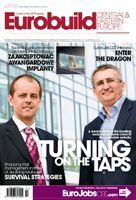They may not have won the tender for
the second line of the Warsaw metro.
and they missed out on the Gdańsk stadium project too. Nevertheless, three of the largest Chinese engineering and construction companies – China Overseas Engineering Group, China Railway Tunnel Group and the Shanghai Construction Group – are here to stay Mladen Petrov, ‘Eurobuild CEE’: Mr Xiang, is this your first visit to Poland?Zhao Xiang, vice president, China Overseas Engineering Group: No, not at all. This is in fact my fifth visit here.I see you are serious about Poland. What exactly brings you here?ZX: Well, Poland is a large country. Ever since Poland joined the European Union a lot of progress has been made, but the country still has great potential. In fact, of the group of 10 countries that joined the EU five years ago, we believe this is the most promising market. Let’s just look at the current infrastructure in the country – there is still a massive amount of work that needs to




























































